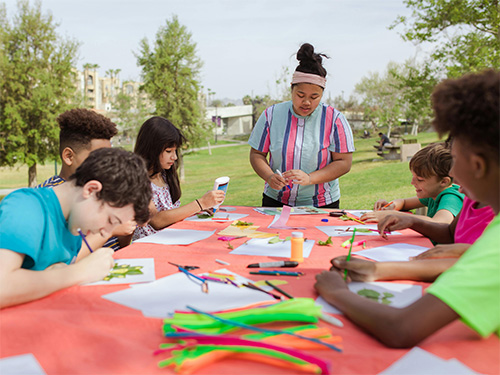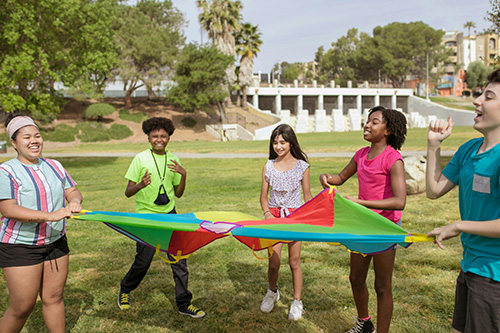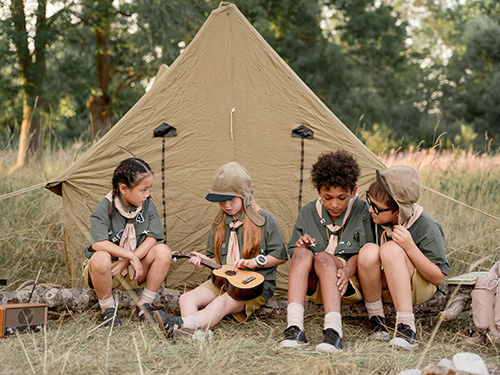(Posted 2025 April)
 It’s hard to believe that it’s time to make plans for the summer. In fact, summer camp registration has already begun for many programs. It’s important for children to stay active and keep their minds engaged while school is on break. Summer camps can provide those opportunities while filling a need for children to be occupied during the workday.
It’s hard to believe that it’s time to make plans for the summer. In fact, summer camp registration has already begun for many programs. It’s important for children to stay active and keep their minds engaged while school is on break. Summer camps can provide those opportunities while filling a need for children to be occupied during the workday.
Camps are also a fantastic way for children to make new friends, learn new skills, have therapeutic experiences, and enjoy the great outdoors. Some camps offer scholarships or discounts specifically for foster children, making these experiences more accessible.
Depending on each child's comfort level and your family's schedule, you can choose between day camps and overnight camps. Day camps can provide structured activities while allowing children to return home each evening, whereas overnight camps offer a more immersive experience. Be sure to include your resource worker and the child’s biological family in decisions about the child’s readiness to attend a sleepaway camp. Here are a few tips about summer camps.
Fairfax County Park Authority Summer Camps offers a variety of summer camps catering to different interests such as sports, arts, science, and adventure. Fairfax County youth in foster care often meet the criteria for scholarships or reduced fees for Park Authority classes. Find out more about qualification criteria and steps to apply for fee waivers and scholarships.
 Fairfax County Neighborhood and Community Services offers a variety of camps, and many of them are offered on a sliding fee scale. Many NCS camps are designed for children with specific needs or interests, such as therapeutic camps, sports, performing arts, or those for teens. Registration for NCS camps opens between March 11 and April 2, 2025.
Fairfax County Neighborhood and Community Services offers a variety of camps, and many of them are offered on a sliding fee scale. Many NCS camps are designed for children with specific needs or interests, such as therapeutic camps, sports, performing arts, or those for teens. Registration for NCS camps opens between March 11 and April 2, 2025.
Fairfax County Public Schools Guide to Summer Camps 2025
This guide includes many community resources to help parents of guardians identify camps that might be helpful. The guide has been organized by categories including general camps, camps for physical, emotional, and intellectual disabilities, and ADHD, autism, etc. facilitate easy navigation and includes all essential contact information for registration.
Children who are placed in foster homes approved by the department may attend a specialized summer camp within the following guidelines:
Approval of expenditures up to $500 may be given by the child’s specialist. The program manager will consider exceptions to this amount only if the child has a significant disability or the cost of camp is less than the child’s day care expenses.
 The approval must be given in advance by the child’s specialist, with sufficient time for the department’s contracts staff to work out a fiscal agreement with the camp. Payment for camp may be made only by the department directly to the camp. We are unable to reimburse foster parents if they make payment to a camp. (Note: The department still pays for regular daycare summer camp for school-aged children; this FAQ refers to specialized summer camps only.)
The approval must be given in advance by the child’s specialist, with sufficient time for the department’s contracts staff to work out a fiscal agreement with the camp. Payment for camp may be made only by the department directly to the camp. We are unable to reimburse foster parents if they make payment to a camp. (Note: The department still pays for regular daycare summer camp for school-aged children; this FAQ refers to specialized summer camps only.)
Reimbursement for other types of recreational fees, such as for a class or entry ticket to a major amusement attraction (e.g., Busch Gardens, Kings Dominion, etc.) must be approved in advance by the specialist. The decision to make a direct payment to the vendor by the department or to reimburse the foster parent will be made on a case-by-case basis.
These guidelines are to help you with summer planning. If you have any questions, please reach out to your resource and support specialist.
 Summer camp can be an exciting and sometimes nerve-wracking experience. So, once you have selected the camps and made the arrangements, start early preparing them for the experience. Here are three tips to help make the transition smoother and ensure a positive camp experience:
Summer camp can be an exciting and sometimes nerve-wracking experience. So, once you have selected the camps and made the arrangements, start early preparing them for the experience. Here are three tips to help make the transition smoother and ensure a positive camp experience:
- Familiarize Children with the Camp Environment
“Visit” the camp, if possible. Take a tour of the camp before the start date to increase their familiarity. Meet the staff and get to know some friendly faces. If this isn’t possible, check out the camp online and review the daily schedule so they will know what to expect and feel less anxious.
- Build Excitement and Address Concerns
Talk about the fun experiences they will have at camp. Building anticipation can help shift their focus from fear to excitement. Listen to any concerns the child might have, answer questions and provide reassurances. Foster some independence by practicing skills they might need at camp. It can boost self-esteem to help make their bed, choose their outfits, or manage their own hygiene.
- Pack Together for Camp
Work with the child to create a packing list and increase their feelings of control. Pack a few favorite comfort items for emotional support. For a day camp, a favorite water bottle, tote bag, t-shirt or snack can provide reassuring reminders throughout the day that your child is deeply cared for. For sleepaway camp, a stuffed animal, family photo, or a small blanket can reduce stress. Label all personal items with the child's name to make it easier for them to keep track.
Your support and encouragement and preparation can make a significant difference in ensuring that they have a positive and memorable time.
This article posting is part of the Foster Family News monthly newsletter designed to keep foster parents informed about all the new and notable happenings in Fairfax County.
Learn about what the Foster Care and Adoption program has planned for foster families - stay on top of trends, participate in trainings and learn about policy changes.


